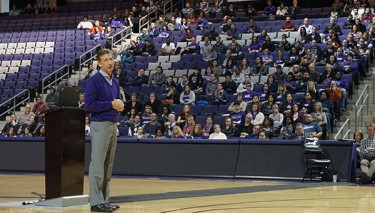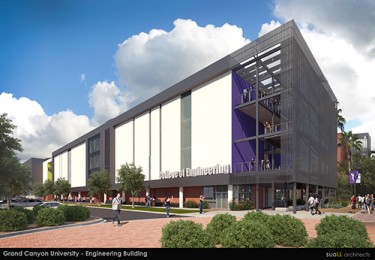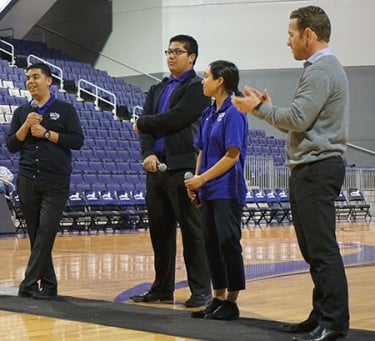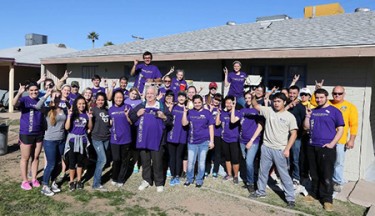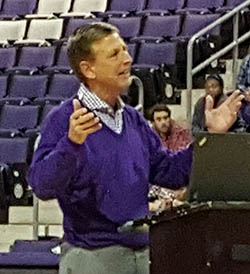By Janie Magruder
GCU News Bureau
During an end-of-year meeting Thursday in a Grand Canyon University Arena that was bustling with exuberant employees, President Brian Mueller had plenty of good news to share:
- High school students in GCU’s neighborhood have received 11,611 hours of free tutoring in the University’s Learning Lounge since it opened two years ago.
- Violent crimes in the Canyon Corridor around GCU have dropped nearly 40 percent, in large part because of a neighborhood safety partnership with the Phoenix Police Department.
- GCU staff and students have donated free labor to repair 100 homes in the area south of campus under a unique University alliance with Habitat for Humanity.
- Student enrollment is up more than 10 percent, as is revenue, for the third quarter of 2015 compared to the same period in 2014.
- And oh, those traditional students: 758 are members of GCU’s Honors College, and incoming students have an average GPA of 3.5.
Mueller touched on all of this — and much more — during his 90-minute chat with faculty and staff. And yet he concluded, “Next year could possibly be our biggest year.”
Community compassion abounds
Mueller delivered a report card on the progress of a five-point plan he unveiled just a year ago. The initiatives focus on developing a STEM (science, technology, engineering and math) workforce, supporting K-12 outreach and revitalizing the neighborhood by renovating homes, improving safety and creating jobs.
There were a lot of As.
STEM program growth: In 2016, GCU estimates 10,364 students will be studying STEM in two engineering buildings — one that opened this fall along Camelback Road and a second under construction north of Camelback Garage. By 2020, the number of STEM students at GCU is expected to more than double to 21,457.
“When companies look at the west side of Phoenix, they’re going to say, ‘That’s where I want to be,’” Mueller said of the expanded workforce opportunities for STEM graduates.
K-12 outreach: Students at nearby Alhambra High and Bourgade Catholic High have something in common with kindergartners through eighth graders in the Alhambra elementary district. Both are doing better in school partly because of free tutoring they get on GCU’s campus at the hugely successful Learning Lounge.
Alhambra High, a D-rated school in 2012, is now just nine points away from becoming a B-rated school. Also, 29 percent more students graduated from the school in 2014-15 compared to the previous year, and the number of students there taking advanced-placement exams grew by an astounding 75 percent.
Dr. Joe Veres, director of K-12 outreach programs, and three students spoke during Thursday’s employee meeting.
“It’s been a great honor working with Dr. Joe from the beginning,” said junior biology major Juan Villegas, who began tutoring in the Learning Lounge when it opened in October 2013. “It’s been amazing to see kids walk in the door the first day, then coming every day not just to get help with their education but with their life.”
GCU freshman May Carreon, who got help in the Learning Lounge as an Alhambra High student and now has a scholarship from the Colangelo College of Business, is a tutor in the Lounge.
“I’m really blessed with all my opportunities, and I expect to grow and learn more and do my best to be the best I can be,” Carreon said.
Next month, in conjunction with the GCU Foundation, the University will launch the Students Inspiring Students Scholarship Fund in an effort to expand the successes at Alhambra to other inner city schools on the west side. The scholarship fund will offer full-ride scholarships to area students who meet academic requirements and have studied in the Learning Lounge. In exchange, Mueller said, the students will pay it forward by donating time back to the Lounge while at GCU to help the next group of high school students behind them. This will create a self-funded, sustainable and scalable model that will be truly transformational, he said.
“This is the single most dynamic program for educational transformation in this country, and there’s no limit to what it can accomplish,” Mueller said.
The goal is to find corporate partners who can help provide 800 scholarships over the coming four years. An introductory event and dinner for potential donors is scheduled for Thursday, Jan. 7, at GCU Arena before a Lopes men’s basketball game.
Renovating homes: Employees and students for the past year have been volunteering on home repair projects in GCU’s neighborhood as part of a partnership with Habitat for Humanity.
But they also can benefit Habitat financially by taking advantage of a University program, Donate to Elevate, that allows them to finance renovation projects by contributing to an Arizona state tax-credit program. So far, nearly $900,000 has been pledged by employees to the program for 2016, and the goal is $1.5 million.
Homeowner Hannah Lucas told the Arena audience that she, her parents and her sister all work or attend college full-time and could not have made the necessary improvements to their home without GCU’s help. “Our home is beautiful and very safe, and we are happy and healthy,” Lucas said.
Donate to Elevate also helps qualified students with private school tuition, among them Donovan Welbaum, who had a rough time on the streets before being enrolled in Phoenix Christian Preparatory School. “My life has changed because of a lot of people have invested in my life through tuition tax credits,” Welbaum told the GCU employees. “I thank God for the opportunity to turn my life around.”
Improving safety/creating jobs: Property crimes also have dropped 33 percent in GCU’s neighborhood, Mueller said.
Additionally, a partnership with Love International, a church near GCU’s 27th Avenue office complex, has enabled the University to recently hire 12 people who live within a two-mile radius of campus.
“Those people now have an opportunity to receive free education at GCU,” Mueller said of the University’s employee tuition benefit, “and their children have an opportunity to get a free education.”
Academic achievements on the rise
Mueller’s University report card wouldn’t have been complete without details on the growth in students, academics and programs. There was plenty to tell.
GCU’s speech and debate team, just three years old and led by communications instructor Barry Regan, is ranked 16th in the country. Regan called an upcoming national tournament for which two of his students have qualified “the NCAA basketball tournament for parliamentary debate.” One of those qualifiers, junior Thomas Rotering, had an interesting experience that Regan shared with his fellow employees Thursday.
“Thomas was in his semifinal round, and he and his opponent were given the resolution ‘10 percent of adults admit having an addiction to______.’ His opponent decided to fill in the blank space with ‘online pornography.’ By defining it this way, she argued that her burden is to argue that online pornography is bad, and that Thomas had to argue it’s good.
“During the cross-examination period, he asked her, ‘Do you believe it is fair to ask a Christian who attends a Christian university to defend that online pornography is good?’ She responded by stating that debaters must be prepared to defend both sides of every issue.
“In response, during his next speech, Thomas spent the majority of his time arguing that forcing Christians to divorce themselves from their religious beliefs harms their own self-agency and relationship with God. He ended his speech by asserting that limiting individual autonomy through suppression of religious freedom has problematic secular and constitutional implications, which showed how her reasoning harms both secular and religious communities alike.
The judges, all of whom were from public schools, ruled Rotering won the round in part because of these arguments, Regan said.
“This is a reflection of what our students are learning in their classrooms, and that what they learn in their classes have real-world implications,” he concluded.
No shortage of highlights
Other notables shared by Mueller:
- The University reinvested more in campus infrastructure and technology from 2009 to September 2015 than it made in after-tax profits during that period.
- GCU will continue investing heavily in residence halls, classrooms, laboratories, student amenities and technology from 2016-2018.
- In addition to the second engineering building, the University is building three residence halls, a student services/athletics/administration building, recreation fields, a soccer stadium and a complex at 27th Avenue that includes office space and the GCU Hotel. The University also is about to open the renovated GCU Golf Course.
- GCU has 75,073 total students — about 59,600 online and about 15,500 traditional.
- It is projected GCU will have between 17,500 and 18,000 traditional students in 2016 and 25,000 in 2020.
- Approximately 7,000 new students started last fall. There was a 31 percent spike in the number of students from California.
- 8,300 students live on campus.
- In 2010, 8,244 students graduated. An all-time high of more than 16,614 students are projected to graduate in 2015.
- Three-year student loan default rates among GCU students have dropped from 19 percent in 2010 to an estimated 9.8 percent in 2013.
- In 2015, faculty contributed scholarship to 263 publications and made 219 presentations.
- The number of employees has grown from 1,365 at the end of 2008 to 3,900 this month.
Mueller closed the meeting with a note on GCU’s blessedly loud and garish student group, the Havocs, which this semester conducted five community outreach events. On their own, they built Havocs with Heart.
“It’s an example of them following your leadership,” Mueller told the employees, “and becoming who we are.”
Contact Janie Magruder at (602) 639-8018 or [email protected] .
Contact Janie Magruder at (602) 639-8018 or [email protected].

